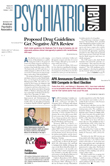An Illinois task force that has recommended screening of pregnant women for depression and school children for social and emotional problems has drawn fire from a number of quarters in the state.
Opposition to recommendations put forward by the Illinois Children's Mental Health Partnership appears to stem from concern about government overreach on the part of conservative groups and legislators and from public anxiety about the use of medications in children.
But some of the opposition to the recommendations, which are preliminary, also appears to be fueled by antipsychiatry groups, said sources involved in the partnership.
The Children's Mental Health Partnership is a creation of the Illinois Children's Mental Health Act of 2003, an ambitious piece of legislation aimed at transforming mental health services for children, with an emphasis on prevention, early intervention, and coordination of services across agencies. The bill was signed into law last year by Illinois Gov. Rod Blagojevich (D).
The partnership was charged with developing recommendations to the governor to implement those goals; earlier this year it released a draft for public comment. That draft included language saying that all pregnant women should be screened for depression, and all school children should be assessed for social and emotional development.
The recommendations drew heavily from a previous report by a state task force on children's mental health.
Barbara Shaw, chair of the Children's Mental Health Partnership, told Psychiatric News that the intent of the recommendation was that voluntary screening of pregnant women and school children was an ideal that the system should strive to achieve by ensuring access to mental health services. The recommendations were in draft form, and a new version was scheduled to be released at press time.
But Shaw said that some legislators—abetted by what she said was an inaccurate report in the conservative publication Illinois Leader—assumed that the partnership was calling for mandatory screening.
Moreover, she said, some misinterpreted the word “screen” to mean diagnose and label. “They read it as meaning we wanted to force people to screen their kids, label them as mentally ill, and give them drugs,” she said. “That's the connection they made.”
Lawmakers Fear Government's Role
Among those who protested the partnership's recommendations was Illinois state Rep. Patti Bellock (R), one of the sponsors of the original mental health law. “I did have some serious concerns that I have voiced about the preliminary plan,” Bellock told Psychiatric News. “We have had a lot of discussions, and they are making some changes. But I have gotten calls from all over, especially about the screening issue. That seems to be an issue with people around the country even.”
Another Illinois state representative, Chris Lauzen (R), who had received similar assurances that future draft recommendations would be clarified, nevertheless voiced distrust of government and of the “labeling” of children by psychiatrists and mental health professionals. Lauzen represents a conservative district to the west of Chicago.
“My experience over the last 12 years with government power is that once you establish it, you can never overcome it,” Lauzen told Psychiatric News. “People don't fully appreciate why many citizens are so angry when they see wild behavior out of [the state capital] Springfield. [Legislators] are the last people who should be deciding what is normal and what is abnormal. And I certainly don't want some procedure they come up with to be sorting out our children in the schools.”
He also expressed distrust about the use of medications, saying,“ When my kids are upset, they go outside and let nature and endorphins take care of the problem.”
Lauzen, who also voted for the original legislation, said, “We want all of our citizens to have access to mental health services, but the idea that we are going to run everyone through some screening system with who knows what kind of values applied to them is unacceptable.”
According to Shaw and others familiar with the controversy, this tempest over a legislative effort that has what many mental and public health leaders would call unimpeachable goals, appears to reflect a number of factors: misinformation, misapprehensions about the language and goals of public health and the value of prevention, and an abiding stigma surrounding mental illness.
Psychiatrist Carl Bell, M.D., who is a member of the partnership and argued vigorously for many of the prevention recommendations, said that antipsychiatry forces have created some of the heat around the mental health law.
Prevention Is Hard to Digest
Bell also said that prevention measures are not generally welcomed even in the mental health community, where they are sometimes perceived as taking resources away from treatment. “No one is concerned about screening kids and medicating them for diabetes,” he said. “But having a public health conversation around prevention of psychiatric disorders is not quite digestible yet.”
Bell is president and chief executive officer of the Community Mental Health Council in Chicago.
Much of the language of the Children's Mental Health Act is modeled on recommendations by the President's New Freedom Commission on Mental Health.
The Children's Mental Health Act is posted online at<www.legis.state.il.us/legislation/93/SB/pdf/09300SB1951enr.pdf>; the task force report on which the partnership based its recommendations is posted at<www.ivpa.org/childrensmhtf/ICMHTF_FinalReport2003_1.pdf>.▪
